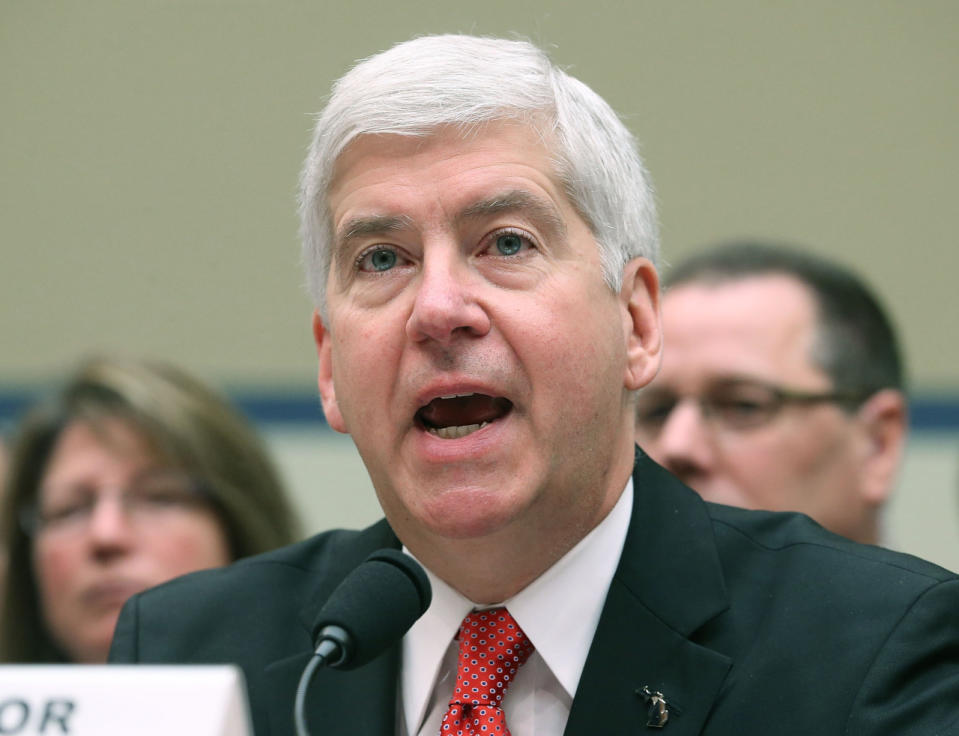Gov. Snyder, EPA point fingers at congressional hearing on Flint water crisis
The Flint blame game continued Thursday as Michigan Gov. Rick Snyder delivered his first testimony on the poisoning of the impoverished city’s water supply to members of the House Committee on Oversight and Government Reform in Washington, D.C.
In his opening statements, Snyder said that government officials at all levels, including himself, “failed the families of Flint” and insisted that “this is not about politics or partisanship. I am not going to point fingers or shift blame. There is plenty of that to share, and neither will help the people of Flint.”
But it didn’t take long for the blame to start flying — or for the hearing to take on a very partisan tone.
As he continued his opening statements, Snyder went on to highlight “systemic failures at the Michigan [Department of Environmental Quality]” as well as the federal Environmental Protection Agency, where, he said, “inefficient, ineffective, and unaccountable bureaucrats … allowed this disaster to continue unnecessarily.
“The fact is, bureaucrats created a culture that valued technical compliance over common sense — and the result was that lead was leaching into residents’ water,” Snyder said, noting that many cities face similar crises because of outdated lead plumbing systems. “And if the DEQ and EPA do not change … and if the dumb and dangerous federal lead copper rule is not changed … then this tragedy will befall other American cities.”
EPA Administrator Gina McCarthy was also in the hot seat at Thursday’s hearing. And when it was her turn to deliver opening statements, McCarthy tossed the blame right back to the state of Michigan.
“The [state’s] interactions with us were intransigent, misleading and contentious,” McCarthy said in her written testimony. “As a result, EPA staff were unable to understand the potential scope of the lead problem until a year after the switch and had insufficient information to indicate a systemic lead problem until midsummer of 2015.”
The finger pointing was hardly contained to the witness table. Exasperated committee members took aim at both Snyder and McCarthy — with Democrats largely skewering the state while Republicans put the heat on federal regulators.
SLIDESHOW – Water crisis in Flint, Michigan >>>
Rep. Elijah Cummings, D-Md., kicked off the hearing by blaming Snyder’s administration for creating “an entire generation of children who suffer from brain damage, learning disorders, and many other horrible effects of lead poisoning.”
Calling for the Republican governor to face repercussions, Cummings said, “There is no doubt in my mind that if a corporate CEO did what Gov. Snyder’s administration has done, he would be hauled up on criminal charges.”
Rep. Gerry Connolly, D-Va., condemned the actions of Flint’s emergency managers, who were appointed by Gov. Snyder to slash the struggling city’s spending.
“This is a failure of a philosophy of governance that you advocate,” Connolly said of the controversial emergency manager law that Snyder revised and pushed into effect this past December, a month after its original version was rejected by Michigan voters.
“The taint and the stain that state government has put on this country in the form of Flint will be a long time being erased,” said Connolly. “At some point, the buck stops at your office.”
Snyder defended his emergency manager law but admitted Flint’s appointed leaders failed to prevent the contamination of the city’s water supply.
Matt Cartwright, D-Pa., called for Snyder to resign, declaring that “people who put dollars over the fundamental safety of people do not belong in government.”
Cartwright dismissed the governor’s claim that he did not know about the situation in Flint until last fall — more than a year after the city started getting its water from the Flint River.
“You were not in a medically induced coma for a year,” he said, accusing Snyder of expressing “false contrition” and “phony apologies.”
“There you are — dripping with guilt but drawing your paycheck, hiring lawyers at the expense of the people, and doing your dead level best to spread accountability to others and not being accountable,” Cartwright said. “It’s not appropriate.”

Michigan Gov. Rick Snyder speaks at the House Oversight and Government Reform Committee hearing about the Flint water crisis, March 17, 2016, in Washington, D.C. (Photo: Mark Wilson/Getty Images)
Meanwhile, Republicans held McCarthy’s feet to the fire. “I hear calls for resignation. I think you should be at the top of the list,” Rep. John Mica, R-Fla., told the EPA administrator. Mica pointed to the concerns about lead content in Flint’s water that were reported by the EPA’s regional water expert Miguel Del Toral last spring.
“You can read Del Toral’s report. It’s incredibly accurate,” Mica said. “This was dated in June. And not a damn thing was done, really, until January of this year.”
McCarthy shot back, insisting it was the Michigan DEQ that was really at fault. The EPA, McCarthy said, instructed the DEQ in July to require that Flint’s water be treated with corrosion controls.
“We’ll do it,” McCarthy said the state regulators told them. “Since that point in time, MDEQ slow-walked everything they needed to do. That precluded us from being able to jump in to the rescue.”
The EPA, she said, was “strong-armed. We were misled. We were kept at arm’s length. We could not do our jobs effectively.”
Committee Chairman Jason Chaffetz, R-Utah, also took aim at McCarthy, often raising his voice and scolding the EPA administrator when she attempted to challenge his questions before he was finished asking them.
“Here you have a city whose begging for help, they know they’re in trouble, they’re asking for that help. And I’ve got email after email from the EPA saying you know maybe we should hold off,” Chaffetz said, pointing to a series of damning internal memos, including one in which an EPA employee wrote, “I’m not so sure Flint is the community we want to go out on a limb for.”
“I’m not excusing [Michigan officials] at all, but you need to take some responsibility because you screwed up!” He continued, almost yelling. “You messed up 100,000 people’s lives, 10,000 of those people are 6-years-old or younger, and you’re acting like you did nothing wrong.”
Chaffetz then ceded the floor to Democrat William Lacy Clay, of Missouri, who criticized Chaffetz and other Republicans on the committee for attempting to pin the blame on the EPA.
“I have to hand it to my Republican colleagues. They are actually making their argument with a straight face,” Clay remarked, noting that many House Republicans, including Chaffetz and other committee members, have voted on many occasions to defund the EPA and restrict the agency’s regulatory powers.
“Now they’re criticizing the EPA for not doing more when Gov. Snyder fell down on the job,” Clay said. “The irony is almost overwhelming, isn’t it?”
Clay also quoted Republican presidential candidates Donald Trump and Ted Cruz, who have both promised to eliminate the EPA and return its regulatory powers to the state, as well as Marco Rubio, who before dropping out of the race earlier this week vowed to scale back the Clean Water Act. “Regulations in this country are out of control,” Rubio said in January. “Especially the Employment Prevention Agency, the EPA.”
Clay pointed out that “despite all these Republican statements that the EPA should be eliminated and it overreaches, the biggest criticism of Republicans here today was that the EPA was not aggressive enough” in its response to the situation in Flint.
“Obviously, the state of Michigan did not know best in this case,” Clay said, but “the EPA did ultimately step in here because Michigan was not doing their job.”
Environmental activist Erin Brockovich expressed her frustration over the partisan bickering in a conversation with Yahoo News and Finance Anchor Bianna Golodryga.
Brockovich said she thinks the hearings “are frankly a waste of everybody’s time,” as are Snyder’s efforts to defend himself from culpability.
“This is a governor of a state who had clear and present warning, and he delayed, and how long this had been going on under his watch is of great concern,” she said. “He hasn’t exhibited great leadership, he shouldn’t be in that role, and I wouldn’t trust him going forward if he were my governor.”
In addition to echoing calls for Snyder’s resignation, Brockovich suggested that fixing some of the “fatal flaws” of the EPA’s system should start with removing those at the top of the federal agency who are “not doing their job.”
“The EPA is overburdened, understaffed and, let’s be honest, they’re flat out broke,” said Brockovich, who argued that while there are certainly “well-meaning people” at the agency, “the politics and the policies within the EPA are making it impossible for people to do their job.”
Overall, Brockovich condemned efforts from either side of the aisle to frame the water crisis as a partisan issue.
“We’ve got to stop politicizing water,” she said. “It’s a human right. It doesn’t matter your race. It doesn’t matter if you’re rich or poor. It doesn’t matter what your party line is. This is our water supply.”

Desiree Duell, left, reacts to Gov. Snyder’s testimony while her 10-year-old son David naps nearby. (Photo: Mark Wilson/Getty Images)
(Cover tile photo: Kevin Lamarque/Reuters)


